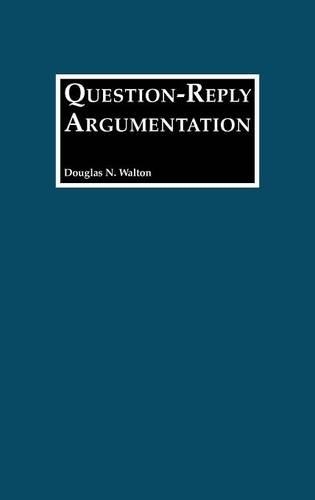
Question-Reply Argumentation
(Hardback)
Publishing Details
Question-Reply Argumentation
By (Author) Douglas N. Walton
Bloomsbury Publishing PLC
Praeger Publishers Inc
9th November 1989
United States
Classifications
Tertiary Education
Non Fiction
Philosophy: logic
168
Physical Properties
Hardback
424
Width 156mm, Height 235mm
822g
Description
This study of logical fallacies, errors, faults, illicit attacks, blunders and other critical deficiencies in interrogation and reply has been written in the tradition of informal fallacies in logic. It presents 139 case studies; some of these come from political debates and some from interviews, legal cross-examinations and other sources. Walton uses these examples of tricky, aggressive, argumentative or fallacious questions to develop guidelines for criticizing "questionable" questions (and in some cases their replies) on logical grounds. Among the types of problematic question analyzed are: the traditional so-called fallacy of many questions, illustrated by the famous "Have you stopped beating your wife"; black and white questions; terminologically loaded questions and questions containing personal attacks. These and other types of problematic questions, as well as evasive replies and replying to a question with a question are studied. Critical errors of reasoning are identified and analyzed by developing context-based, normative models of reasonable dialogue in which a questioner must have freedom to ask informative and probing questions and the respondent must be constrained to give reasonably direct, not overly-evasive answers. In this era of negative and evasive political campaigning, with candidates employing skilful tactics of manipulating public opinion to assure election rather than taking clear stands and seriously debating issues in an informed and sincere manner, "Question-Reply Argumentation" is relevant reading for those who take democracy seriously. The methods used reflect a shift from earlier semantically based theories to current, pragmatic, dialogue-based models and will be of interest to logicians and linguists. The volume's conclusions should challenge some current preconceptions.
Reviews
Walton's book is a study of several fallacies in informal logic. Focusing on question-answer dialogues, and committed to a pragmatic rather than a semantic approach, he attempts to generate criteria for evaluating good and bad questions and answers. The book contains a discussion of such well-recognized fallacies as many questions, black-or-white questions, loaded questions, circular arguments, question-begging assertions and epithets, ad hominem and tu quoque arguments, ignoratio elenchi, and replying to a question with a question. In addition. Walton develops several artificial dialogue games and has an excellent discussion of burden of proof in nonlegal contexts. The discussion is for the most part nontechnical and does not presuppose any training in formal logic. It is illustrated with many (sometimes overlong) examples of fallacies drawn from real life. . . . Walton's book breaks new ground on a number of issues. For informed readers.-Choice
"Walton's book is a study of several fallacies in informal logic. Focusing on question-answer dialogues, and committed to a pragmatic rather than a semantic approach, he attempts to generate criteria for evaluating good and bad questions and answers. The book contains a discussion of such well-recognized fallacies as many questions, black-or-white questions, loaded questions, circular arguments, question-begging assertions and epithets, ad hominem and tu quoque arguments, ignoratio elenchi, and replying to a question with a question. In addition. Walton develops several artificial dialogue games and has an excellent discussion of burden of proof in nonlegal contexts. The discussion is for the most part nontechnical and does not presuppose any training in formal logic. It is illustrated with many (sometimes overlong) examples of fallacies drawn from real life. . . . Walton's book breaks new ground on a number of issues. For informed readers."-Choice
Author Bio
DOUGLAS N. WALTON is Professor of Philosophy at the University of Winnipeg and is currently a Killiam Research Fellow (1987-1989) of the Canada Council. His writings on various aspects of philosophy, pragmatics, linguistics, ethics, logic, and education have been published frequently and widely since 1971 and include numerous articles in scholarly journals as well as contributed chapters to books. He is the author of Informal Logic and Practical Reasoning and coauthored Argument: The Logic of the Fallacies. He also wrote Ethics of Withdrawal of Life Support Systems: Case Studies on Decision-Making in Intensive Care (Greenwood Press, 1983 and paperback by Praeger Publishers, 1987), Physician Patient Decision-Making (Greenwood Press, 1985) and Arguer's Position (Greenwood Press, 1985). In 1989-1990, Walton will be Fellow-in-Residence at the Netherlands Institute for Advanced Study in the Humanities and Social Sciences.
